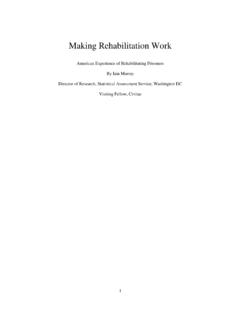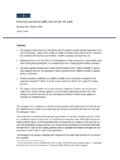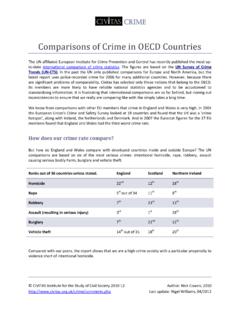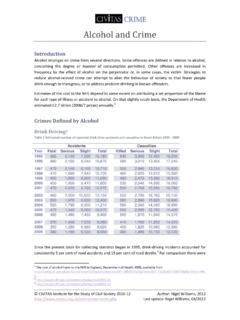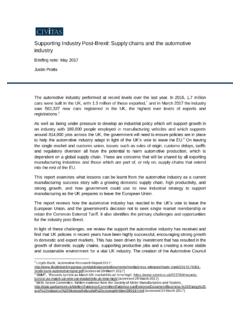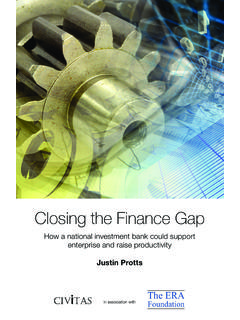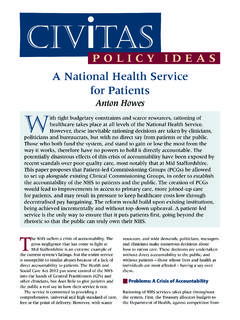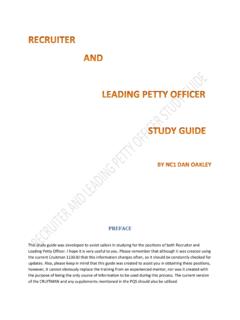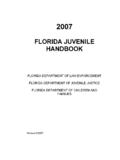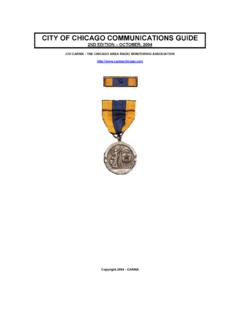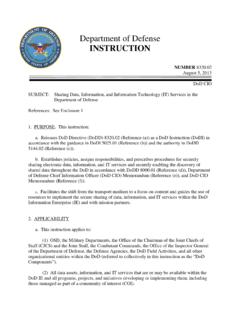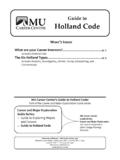Transcription of Institutional Racism and the Police
1 Institutional Racism and the Police : Fact or Fiction? Institutional Racismand the Police : Fact or Fiction?David G. Green (Editor)John Grieve & Julie FrenchMichael IgnatieffMike O BrienRobert SkidelskyInstitute for the Study of Civil SocietyLondonFirst published August 2000 The Institute for the Study of Civil Society 2000email: rights reservedISBN 1-903 386-06-3 Typeset by the Institute for the Study of Civil Societyin New Century SchoolbookPrinted in Great Britain byThe Cromwell PressTrowbridge, WiltshireContentsPageThe AuthorsviForewordDavid G. GreenixThe Age of InequalityRobert Skidelsky1 Does Institutional Racism ExistIn the Metropolitan Police Service?John Grieve & Julie French7 Less Race, PleaseMichael Ignatieff21 The Macpherson Reportand Institutional RacismMike O Brien25 Commentary: Racial Preferences AreNot the Best Way to Create Racial HarmonyDavid G. Green37 Appendix45 Notes48viThe AuthorsJulie French was the Senior Family Liaison Officerwithin the Racial and Violent Crime Task Force, supervis-ing the implementation of family liaison policy within theMetropolitan Police Service (MPS).
2 She joined the MPS in1995, serving for two years at South Norwood Division invarious operational posts. In 1998 she was seconded to astrategic unit responding to the findings of the PublicInquiry into the Death of Stephen Lawrence before joiningthe Racial and Violent Crime Task Force in 1999. She hasa BSc (Hons.) degree in managerial and administrativestudies (Aston University), a four-year course that in-cluded a placement in New G. Green is the Director of the Institute for theStudy of Civil Society. His books include Power and Partyin an English City, Allen & Unwin, 1980; Mutual Aid orWelfare State?, Allen & Unwin, 1984 (with L. Cromwell);Working-Class Patients and the Medical Establishment,Temple Smith/ Gower, 1985; The New Right: The CounterRevolution in Political, Economic and Social Thought,Wheatsheaf, 1987; Reinventing Civil Society, IEA, 1993;Community Without Politics, IEA, 1996; Benefit Depend-ency, IEA, 1998; An End to Welfare Rights, IEA, 1999; andDelay, Denial and Dilution, IEA, 1999 (with L.)
3 Casper).He wrote the chapter on The Neo-Liberal Perspective inThe Student s Companion to Social Policy, Blackwell, Grieve is Deputy Assistant Commissioner ofthe Metropolitan Police , which he joined in 1966 atClapham. He has served as detective in South London andhas worked in every role from undercover officer to policychair on drug squads over a 30-year period. His dutieshave also involved the Flying Squad (two tours of duty),AUTHORSviiRobbery Squad and Murder Squads including East LondonArea Major Investigation Pool. He was a DivisionalCommander at Bethnal Green in East London. He has anhonours degree in philosophy and psychology (NewcastleUniversity) and a master s degree post graduate researchin drugs policy analysis from Cranfield University,travelling on a Swiss charitable scholarship throughoutEurope. DAC Grieve has worked in Europe, America,South East Asia and Australia.
4 He introduced AssetSeizure Investigation in the United Kingdom and wasHead of Training at Hendon Police College. During thattime he organised the Community, Fairness, JusticeConference. He was the first Director of Intelligence forthe Metropolitan Police , led the MPS Intelligence Projectand the Anti-Terrorist Squad as National Co-ordinatorduring the 1996-1998 bombing campaigns. DAC Grievewas appointed Director of the first Racial and ViolentCrime Task Force in August 1998. His interests includewalking, history (including art and Police history) andpainting. He was awarded the QPM in 1997 and the CBEin the millennium honours Ignatieff gained a doctorate in history atHarvard and has held academic posts at King s College,Cambridge, St Antony s College, Oxford, the University ofCalifornia at Berkeley, the University of London and theLondon School of Economics. His books include A JustMeasure of Pain: Penitentiaries in the Industrial Revolu-tion, The Russian Album and Virtual War: Kosovo andBeyond.
5 Screenplays include 1991 and Eugene Onegin aswell as the television play Dialogue in the Dark, directedby Jonathan Miller. He was writer and presenter of a six-part documentary series on nationalism entitled Bloodand Belonging, which was shown on BBC2, CBC and PBSand he hosted the flagship BBC TV arts programme TheLate Show. His columns appear in The Observer, The NewRepublic, The New Yorker, Harpers, Time InternationalINSTITUTIONAL Racism AND THE Police viiiand Prospect, and he is currently teaching at the CarrCentre for Human Rights at the Kennedy School, O Brien was appointed Parliamentary UnderSecretary of State at the Home Office on 5 May 1997. Hewas educated at Blessed Edward Oldcorne School, Worces-ter Technical College and North Staffordshire of Parliament for Warwickshire North since 1992,Mr O Brien was opposition spokesman on Treasury andeconomic affairs from 1995 and the city spokesman fromSeptember 1996 until the general election.
6 He is a formerchairman of the Backbench Home Affairs Committee andhas also been a member of two Commons Select Commit-tees: Home Affairs (1992-1994) and Treasury and CivilService (1993-1995). Mr O Brien is also a former parlia-mentary adviser to the Police Federation. He lectured inlaw for six years before working as a solicitor until April1992 when he was elected MP. He is married with twoyoung Skidelsky is Chairman of the Social MarketFoundation and Professor of Political Economy at WarwickUniversity. He is the definitive biographer of the econo-mist John Maynard Keynes, the third volume of which isdue for publication in November. His wide-ranging areasof expertise include higher education, the economy, theschool curriculum and foreign affairs. His spirited opposi-tion to Government policy on Kosovo led to his dismissalby William Hague as principal opposition Front Benchspokesman in the House of Lords on Treasury affairs.
7 IxForewordThe Macpherson report was a watershed in British racerelations and has led to the adoption of policies by theMetropolitan Police and the Home Office which aredescribed below by John Grieve and the Home OfficeMinister, Mike O Brien. In the hope of encouraging a moreenlightened public debate, the Institute for the Study ofCivil Society is simultaneously publishing two bookscontaining a range of strongly-held views on the s claim that the Metropolitan Police wereguilty of Institutional Racism provoked considerablecontroversy at the time of publication and continues to bestrongly disputed, as the contributions to this book byLord Skidelsky and Michael Ignatieff Racism and the Police is published as acompanion volume to a major study by Norman Dennis,George Erdos and Ahmed Al-Shahi, Racist Murder andPressure Group Politics, which dissects the Macphersonreport and challenges its G.
8 GreenThis chapter first appeared in The Review, Journal ofthe Social Market Foundation, August 1999, and isreproduced by kind Age of InequalityRobert SkidelskyIt is alarming, and deeply depressing, that the inquiryinto the murder of Stephen Lawrence, chaired by SirWilliam Macpherson, should so quickly have achieved thestatus of Holy Writ, despite some spirited pockets ofjournalistic resistance. For while palpably well-inten-tioned, the Report may do more harm than good. And thisfor two reasons. It has firmly inserted the slippery con-cepts of Institutional and unwitting Racism into publicdiscourse, from where they will be very difficult to dis-lodge, and which will inhibit clear thought on race rela-tions. And by concentrating attention on the racial aspectsof the murder and its investigation, it diverts attentionfrom the real lesson of the inquiry, which is the urgentneed to improve the quality of the Police service for allpeople, white as well as black, who lack the position, powerand wealth to command proper attention when they arevictims of is not, in any way, to impugn the motives or effortsof the Lawrence family and their legal team to expose theinadequacy of the service they received.
9 They were rot-tenly treated. Indeed, without the extraordinary determ-ination of Mr and Mrs Lawrence, their son s murder wouldhave remained just another unresolved crime with thepolice bungling hidden from public view. From their pointof view Police incompetence had one obvious explanation: Institutional Racism AND THE POLICE2racism. The Report has satisfied them on this. It hopes itmay be cathartic . But having read the Report I am notconvinced this is the right conclusion; and it is onlyachieved by expanding the definition of Racism so far thatit is invulnerable to falsification. Politics and truth cameinto conflict, and politics , the Report seeks to explain the incompetentpolice investigation into Stephen Lawrence s murder bythe existence of Institutional Racism in the MetropolitanPolice Service. It accepts, that is, the chilling contentionof Lawrence s parents and their legal advisers, whilerejecting the 459 page Report of the Police ComplaintsAuthority that there was: no evidence to support thefinding of racist conduct by any Metropolitan Police Officerinvolved in the investigation of the murder of StephenLawrence.
10 1 Before turning to what the Report means by institu-tional or unwitting Racism , it is important to point out itsplace in the structure of the Report. The chapter on Racism , which tries to define these terms, runs frompages 20-35 of the 335 pages of text. It is not the conclu-sion to which the evidence leads, but the premise of theenquiry. The reader is constantly invited to interpret thedetailed evidence concerning the Police investigation, setout in the following 37 chapters, in light of the theoreticalanalysis of Racism advanced at the start of the Report s typical method is to deal with the activitiesof the officers involved, record their deficiencies oftenpalpable, though sometime rendered so by hindsight andconclude, wherever possible, that unwitting Racism musthave been responsible for their conclusion to which reading the document irresist-ibly leads if I may borrow one of the Report s favouritephrases is that the judge and his advisers knew from thestart that this was how they were going to interpret thebotched Police investigation, in the wider interest, as theyconceived it, of better race relations.
